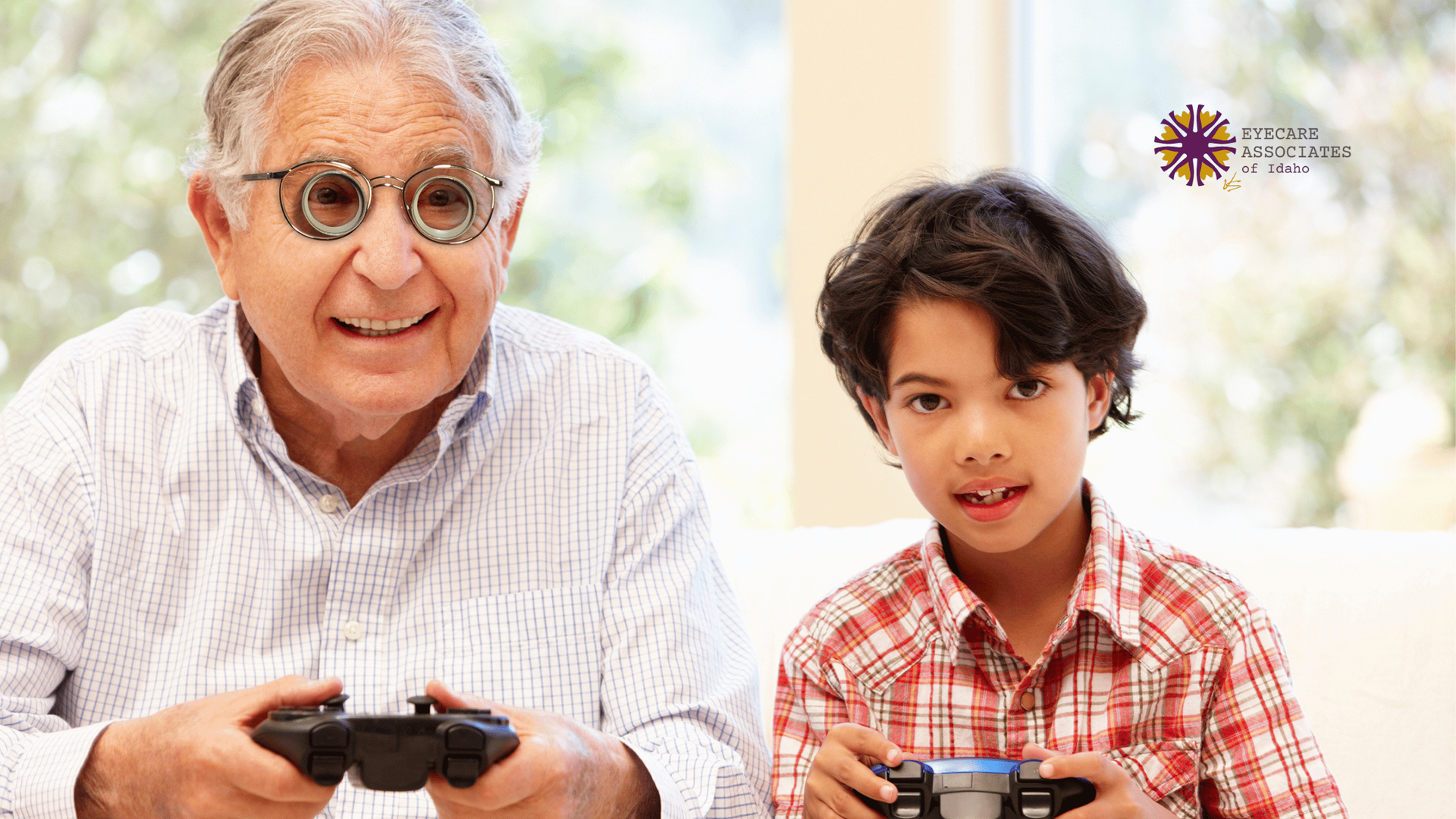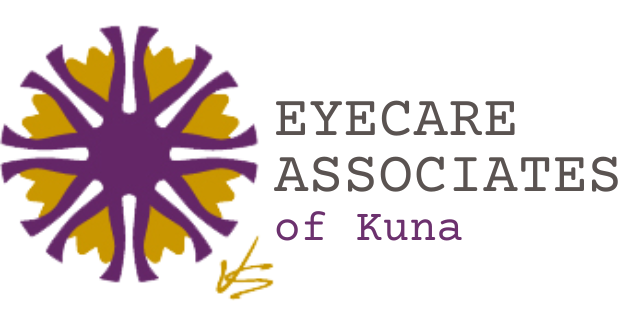Low Vision Care in Kuna, Idaho
Understanding Low Vision and the Importance of Vision Rehabilitation

Millions of Americans experience vision loss that cannot be fully corrected with glasses, contact lenses, or medical treatments. This condition, known as low vision, can significantly impact daily life, making it difficult to read, drive, recognize faces, or complete routine tasks. Fortunately, advancements in low vision care and vision rehabilitation and therapy provide new opportunities for those with low vision to regain independence and improve their quality of life.
At Eyecare Associates of Idaho, we are committed to supporting individuals with low vision through specialized care and expert guidance.
Dr. Mullins is one of the top
low vision specialists in Kuna, Idaho and offers comprehensive
low vision exams at Eyecare Associates of Kuna, along with personalized rehabilitation therapy in their low vision center to help patients maximize their remaining vision. If you or a loved one is experiencing low vision, it's important to fully understand what low vision is and its prevalence in our community, and how expert low vision care is beneficial.
What Is Low Vision?
Low vision is a visual impairment that cannot be corrected with standard eyeglasses, contact lenses, medication, or surgery. It is different from total blindness because people with low vision still have some usable sight. However, they may struggle with activities like reading, writing, recognizing faces, or navigating their environment.
Common causes of low vision include:
- Age-related macular degeneration (AMD) – The leading cause of vision loss in Americans over 50, macular degeneration affects a person's central vision, making detailed tasks difficult.
- Glaucoma – A condition that damages the optic nerve, glaucoma often leads to peripheral vision loss.
- Diabetic retinopathy – A complication of diabetes that damages blood vessels in the retina, diabetic retinopathy causes blurry or distorted vision.
- Cataracts – Clouding of the eye’s natural lens, cataracts lead to glare sensitivity and blurry vision.
- Retinitis pigmentosa – A genetic disorder that leads to gradual vision loss, often beginning with night blindness and peripheral vision decline.
According to the CDC, almost
3.5 million Americans over the age of 40 have low vision due to the aging population and increasing rates of chronic diseases—and by the year 2030, this number is expected to nearly double!
Signs You May Have Low Vision
Low vision can develop gradually, making it difficult to recognize until it starts affecting daily activities.
Common symptoms of low vision include:
- Difficulty recognizing faces
- Trouble reading small print, even with glasses
- Increased sensitivity to glare and bright lights
- Loss of peripheral vision
- Struggling with contrast or color perception
- Difficulty navigating unfamiliar environments
If you or a loved one are experiencing these symptoms, it’s essential to
schedule a low vision exam with Dr. Mullins at Eyecare Associates of Kuna to determine the best steps for vision rehabilitation.
How Vision Rehabilitation Can Help
Vision rehabilitation is a personalized approach to helping individuals make the most of their remaining vision through adaptive techniques, assistive devices, and specialized therapy. The goal is to enhance independence and improve quality of life.
1. Low Vision Aids and Devices
Specialized tools can help people with low vision perform daily tasks more easily. These include:
- Magnifiers – Handheld or electronic magnifiers can enlarge text and images.
- High-contrast and large-print materials – Books, keyboards, and labels with bold, high-contrast fonts improve readability.
- CCTV or screen readers – Video magnifiers or text-to-speech devices enhance accessibility for reading.
- Specialized lighting and filters – Proper lighting and glare-reducing filters improve visibility and contrast sensitivity.
2. Training in Adaptive Techniques
People with low vision can learn new ways to perform daily activities, such as:
- Using eccentric viewing – Learning how to use unaffected areas of vision for tasks like reading.
- Organization techniques – Arranging items consistently to improve accessibility.
- Contrast enhancement – Using contrasting colors to differentiate between objects.
3. Orientation and Mobility Training
For individuals experiencing significant vision loss, mobility training can help them navigate safely. This training may include:
- Using a white cane for detection of obstacles
- Learning safe travel routes in familiar and unfamiliar environments
- Strategies for crossing streets and navigating stairs
4. Psychological and Emotional Support
Losing vision can be emotionally challenging. Vision rehabilitation programs often include counseling and support groups to help individuals adjust to their new reality and maintain a positive outlook.
Why Choose Eyecare Associates of Idaho for Low Vision Care?
At Eyecare Associates of Idaho, we are dedicated to helping patients in Nampa, Kuna, and Boise maintain their independence and improve their quality of life through expert low vision rehabilitation services at our low vision center in Eyecare Associates of Kuna. Dr. Mullins, our low vision specialist at Eyecare Associates of Kuna, works closely with each patient to create customized solutions tailored to their unique needs.
What sets Eyecare Associates of Kuna apart:
- Comprehensive Low Vision Evaluations – We assess functional vision and develop individualized rehabilitation plans.
- Access to Advanced Low Vision Aids – From electronic magnifiers to specialized glasses, we provide a range of assistive devices.
- Patient-Centered Approach – We focus on practical strategies to help patients maintain their daily routines.
Take the Next Step Toward Better Vision
If you or a loved one is experiencing low vision, you are not alone—and help is available. Vision rehabilitation can provide the tools and techniques needed to regain independence, enhance quality of life, and make the most of your remaining vision. Schedule a low vision consultation with our low vision experts at Eyecare Associates of Kuna or call 208-314-4863 to learn more! Don’t let low vision hold you back—schedule a consultation with Dr. Mullins today and discover how vision rehabilitation can empower you to live fully!
943 N Linder Road, Suite #102
Kuna, ID 83634
Phone:
(208) 314-4863
Hours:
Monday: 8:30 am – 5:30 pm
Tuesday: 9:30 am – 7 pm
Wednesday: 10:30 am – 5:30 pm
Thursday: 8:30 am – 5:30 pm
Friday: 8 am – 3:30 pm
Sat & Sun: Closed
*Mon-Thur: Closed for lunch from 12-1 pm
310 2nd Street South
Nampa, ID 83651
Phone: (208) 467-1361
Hours:
Monday: 8:30 am – 5:30 pm
Tuesday: 8:30 am – 7 pm
Wednesday: 9:30 am – 5:30 pm
Thursday: 8:30 am – 5:30 pm
Friday: 8 am – 3:30 pm
Sat & Sun: Closed
939 W Beacon Street
Boise, ID 83706
Phone: (208) 344-8758
Hours:
Monday: 9 am – 5 pm
Tuesday: 9 am – 5 pm
Wednesday: 9:30 am – 5 pm
Thursday: 9 am – 5 pm
Friday: 9 am – 3 pm
Sat & Sun: Closed
321 2nd Street South, Suite #102
Nampa, ID 83651
Phone: (208) 475-4840
Hours:
Monday: 1 pm – 5:30 pm
Tuesday: Closed
Wednesday: 1 pm – 5:30 pm
Thursday: 1 pm – 5:30 pm
Friday: 8:30 am – 3:30 pm
Sat & Sun: Closed
All Rights Reserved | Eyecare Associates of Kuna
